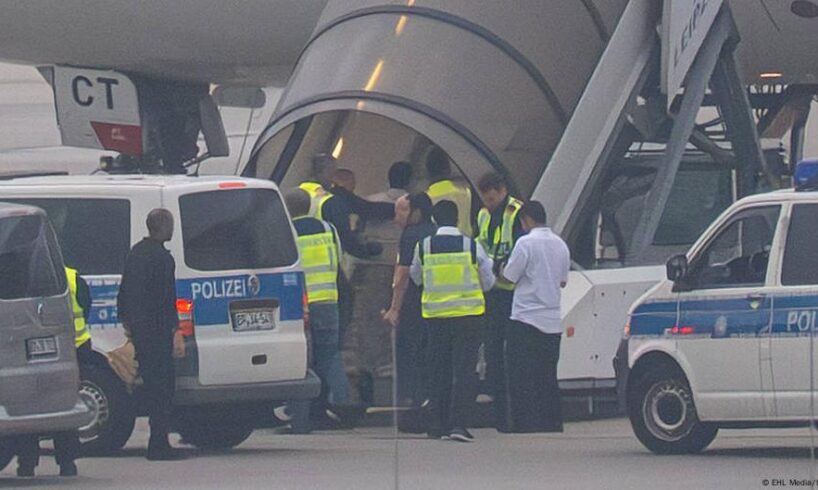
“We have succeeded in organizing another deportation flight with convicted criminals to Afghanistan,” German Interior Minister Alexander Dobrindt said in a press release on July 18, following the departure of a plane from Leipzig to Kabul with 81 Afghan men with failed asylum applications and criminal convictions on board.
As Dobrindt sees it, this flight means that the governing coalition of the center-right bloc of Christian Democratic Union (CDU) and the Christian Social Union (CSU), and the center-left Social Democratic Party (SPD) has made good on its promise.
“We will start deporting people to Afghanistan and Syria, beginning with criminals and dangerous individuals,” they wrote in their coalition agreement earlier this year.
Deportations as part of the ‘repatriation offensive’
Deportation flights had already been conducted under the previous center-left government, which lost the general election on February 23, 2025.
Nevertheless, Dobrindt (CSU) spoke of a “policy shift” — with reference to the “repatriation offensive.” The plan is to put more pressure on countries to take back their citizens. In the case of Afghanistan, this is particularly tricky and sensitive because Germany has not officially recognized the Taliban as a legitimate government.
German deportations to Afghanistan spark rebuke
To view this video please enable JavaScript, and consider upgrading to a web browser that supports HTML5 video
The Islamist Taliban returned to power in August 2021 after 20 years, following the failure of the US-led military mission and the withdrawal of international troops. Today, the humanitarian situation is dire and the radical Islamic fundamentalists have once again begun systematically oppressing girls and women.
An estimated 377,000 individuals of Afghan origin currently live in Germany, with many of them coming as refugees. Many have been permitted to stay, although their individual asylum requests have not been granted. In Germany, just under 11,500 Afghans are registered as required to leave the country, according to data from the Federal Office for Migration and Refugees (BAMF) in May. The BAMF was unable to say whether and how many criminals or dangerous individuals are among those required to leave.
Deportations to Afghanistan were taking place even before the Taliban regained power. They were controversial at the time due to the precarious security situation, and remain so today due to ongoing human rights violations.
‘Serious criminals have no right to reside in our country’
Interior Minister Dobrindt nevertheless intends to stick to his course. “Serious criminals have no right to reside in our country,” he said.
Government spokesman Stefan Kornelius announced on Monday that more deportations are to follow: “This isn’t resolved with one flight.”
Afghan refugee family faces migration reality in Germany
To view this video please enable JavaScript, and consider upgrading to a web browser that supports HTML5 video
Germany is hoping to avoid the impression that it’s boosting the Taliban’s international standing, with the German government speaking of “technical contacts.” The recent deportations were facilitated by the Qatari government.
As Kornelius put it, Qatar’s role is as a mediator: “We’re in ongoing contact with the de facto government in Afghanistan to arrange technical aspects.”
He avoided using the word Taliban, but an agreement had been reached for the current Afghan administration to send two representatives to Germany, who will be based in the embassy in Berlin.
The new diplomats will be tasked with “supporting further planned repatriation flights.” This is the first time that the regime, which is not recognized by Germany, has sent its own personnel to Germany.
Merz: No recognition of the Taliban regime
Germany and Afghanistan are clearly entering a new phase. Nevertheless, following the latest deportation flight, German Chancellor Friedrich Merz was adamant that “[d]iplomatic recognition of the Taliban regime is not up for discussion. That is simply out of the question,” he said at a press conference in Berlin.
However, Conrad Schetter, an Afghanistan expert with the Bonn International Center for Conflict Studies (BICC), believes other countries may follow Russia’s lead and officially recognize the Taliban government, which it did earlier in July.
Schetter pointed to Afghanistan’s close ties with other countries, including Pakistan and Qatar: if these countries follow Russia’s example, it could put considerable political pressure on Western countries, he told DW.
“And this is likely to spark the kind of diplomatic momentum that the Taliban hope will be triggered by Russia’s latest move,” said Schetter.
Russia recognizes Afghanistan’s Taliban government
To view this video please enable JavaScript, and consider upgrading to a web browser that supports HTML5 video
Peace and conflict researcher: Germany lacks credibility
Peace and conflict researcher Nicole Deitelhoff from the University of Frankfurt am Main has strongly criticized Germany’s policy on Afghanistan. In the Tagespiegel newspaper, she wrote that deportations are inadmissible if those affected are at risk of torture or inhumane treatment in their country of origin. What’s more, she predicted that the policy shift will negatively impact on Germany’s reputation.
Deitelhoff points to the German government’s decision to end its admission program for former Afghan workers who aided the Bundeswehr during its military engagement.
“Who can still trust a country that promises its civilian aid workers that it will ensure their safety in the future and then abandons them just like that?” Deitelhoff asked.
This article was originally written in German.
While you’re here: Every Tuesday, DW editors round up what is happening in German politics and society. You can sign up here for the weekly email newsletter, Berlin Briefing.





